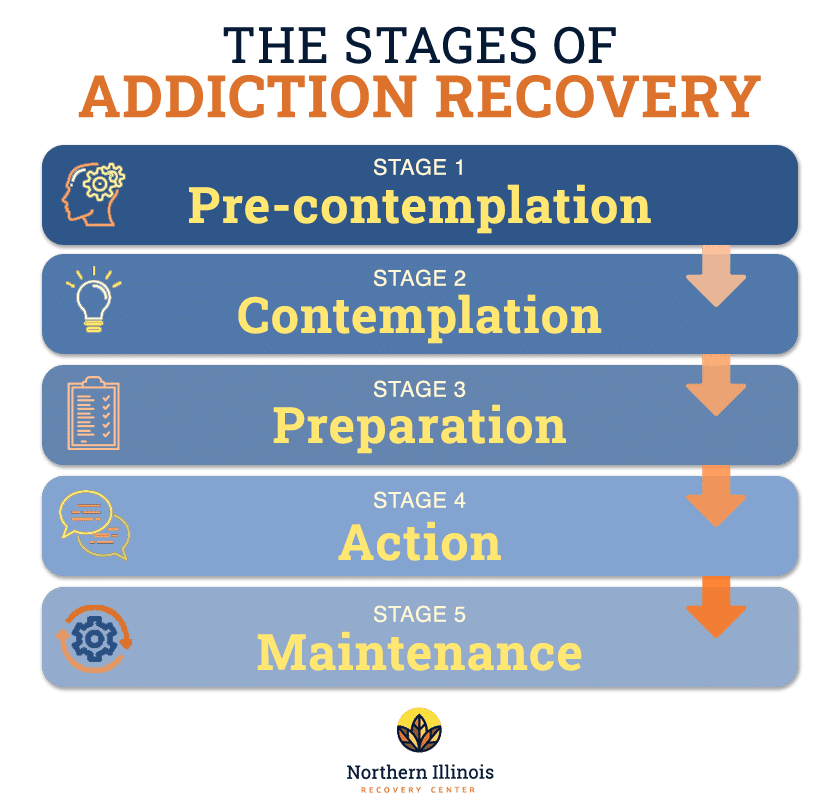Addiction recovery is a long process. It begins when something motivates the addict to change and ends when the individual has regained their financial, physical, emotional, and relationship health and positively changed their behavior. Two University of Rhode Island psychologists, James Prochaska and Carlo DiClemente, broke the process into five stages. Those stages of recovery are pre-contemplation, contemplation, preparation, action, and maintenance. A person who successfully recovers from addiction will pass through all of them; however, many people become stuck in one stage or another. Individuals also may regress, moving forward through the stages for a while, then suddenly move backward one or more stages before finally sustaining recovery. At Northern Illinois Recovery Center, our experienced and compassionate team of counselors and therapists can help individuals successfully work through each stage and recover.
 Pre-contemplation
Pre-contemplation
In this stage, the addict is not actively considering making a change within the next few months. However, during the pre-contemplation phase, the addict first becomes aware of a few bad consequences of their drug use, such as relationship, financial, or legal difficulties. Often they will try to explain away these consequences or minimize them. If others try to encourage them to change, they become defensive. At this point, they perceive that the benefits of substance abuse outweigh the costs. An example is someone who drinks themselves into a stupor every night but can function at least minimally at a job or school during the day.
Contemplation
In the contemplation stage, the addict becomes more aware of the consequences and weighs the pros and cons of changing behavior versus continuing to abuse drugs. They tend to be still ambivalent about change and may doubt that recovery can benefit them long term. An example would be an individual who has received a drunk driving ticket who continues to drink but tries never to drive after drinking again.
Preparation
In this stage, the individual commits to making a change and may plan to do so but has taken no action. They may research options and determine what resources are available to help them. For example, the individual plans to attend a 12-step meeting to successfully examine what they will need to do to recover or research potential comprehensive treatment programs successfully.
Action
The individual actively begins recovery. They accept the support that is given to them and participate in the recovery program they’ve chosen. While the other phases have been mostly cognitive (thinking), this phase requires a behavioral change. Withdrawal from the substance, then counseling, group work, and cognitive-behavioral therapy often will be a part of this stage. During this stage, the individual often thinks about using again and may relapse.
Maintenance
Finally, the last stage is maintenance. Behavioral strategies are key to success in this stage as well. The person now has made sober friends, begun enjoying substance-free leisure activities, and is actively participating in 12-step or similar groups. The individual likely will continue to need re-enforcement from a therapist or group, especially for events such as the office holiday party. They are continually aware of the possibility of relapse and develop strategies to avoid it. They often remind themselves of the progress they’ve made.
Take Action With Us
 Northern Illinois Recovery Center provides affordable, effective addiction treatment. Our program is comprehensive, including inpatient, partial inpatient, and outpatient care; counseling, group therapy; and treatment for other mental illnesses such as depression or anxiety while treating your addiction. We provide a unique outpatient program offered by a state-run facility and an expensive luxury center. We understand the stages involved in successful addiction recovery and can help you journey through them. We work with many major insurers. Give us a call today at 855.786.1978 or connect with us online.
Northern Illinois Recovery Center provides affordable, effective addiction treatment. Our program is comprehensive, including inpatient, partial inpatient, and outpatient care; counseling, group therapy; and treatment for other mental illnesses such as depression or anxiety while treating your addiction. We provide a unique outpatient program offered by a state-run facility and an expensive luxury center. We understand the stages involved in successful addiction recovery and can help you journey through them. We work with many major insurers. Give us a call today at 855.786.1978 or connect with us online.




